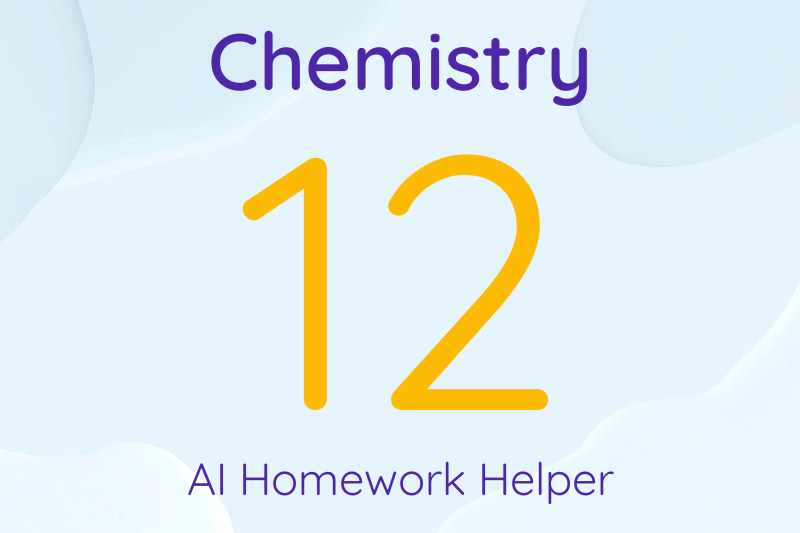Grade 12 – Chemistry
AI Homework Helper
AI Project Helper
-
AI Homework Helper for Grade 12 – Chemistry
AI homework helper for grade 12 Chemistry. Instantly get help with your grade 12 Chemistry homework whenever you need it.Ask Your XTutor About Your Grade 12 – Chemistry Homework

Grade 12 – Chemistry Skills
- Understanding atomic structure and the periodic table
- Knowledge of chemical bonding and molecular structure
- Ability to balance chemical equations and perform stoichiometric calculations
- Understanding of gas laws and the behavior of gases
- Knowledge of solutions, including concentration calculations and colligative properties
- Understanding of acid-base reactions and pH calculations
- Knowledge of redox reactions and electrochemistry
- Ability to predict and explain chemical reactions and their mechanisms
- Understanding of thermodynamics and energy changes in chemical reactions
- Knowledge of organic chemistry, including functional groups and reaction mechanisms
- Ability to analyze and interpret spectroscopic data
- Understanding of equilibrium, including Le Chatelier’s principle and equilibrium constants
- Knowledge of kinetics and reaction rates
- Ability to apply principles of chemistry to real-world applications and problem-solving
- Understanding of laboratory techniques and safety protocols
Grade 12 – Chemistry Curriculum
Grade 12 Chemistry: A Comprehensive Overview
Chemistry is a fascinating subject that explores the composition, properties, and behavior of matter. In grade 12, students delve deeper into the world of chemistry, building upon the foundational knowledge gained in previous years. This article provides a comprehensive overview of the topics taught in grade 12 chemistry, equipping students with a solid understanding of the subject.
1. Stoichiometry
Stoichiometry is the study of the quantitative relationships between reactants and products in chemical reactions. In grade 12 chemistry, students learn to balance chemical equations, calculate the amount of reactants and products involved, and apply stoichiometric principles to solve various problems.
2. Chemical Kinetics
Chemical kinetics focuses on the study of reaction rates and the factors that influence them. Students explore concepts such as rate laws, reaction mechanisms, and the effect of temperature, concentration, and catalysts on reaction rates. They also learn to analyze and interpret experimental data related to reaction kinetics.
3. Chemical Equilibrium
Chemical equilibrium deals with reversible reactions and the state in which the forward and reverse reactions occur at equal rates. Students learn about equilibrium constants, Le Chatelier’s principle, and how to calculate equilibrium concentrations. They also explore factors that can shift the equilibrium position and the impact of these changes on the system.
4. Acids and Bases
The study of acids and bases involves understanding their properties, behavior, and reactions. Grade 12 chemistry covers topics such as pH, acid-base theories (Arrhenius, Bronsted-Lowry, and Lewis), acid-base titrations, and buffer solutions. Students also explore the concept of acid-base equilibrium and its applications.
5. Electrochemistry
Electrochemistry focuses on the study of chemical reactions involving the transfer of electrons. Students learn about redox reactions, electrochemical cells, electrolysis, and the calculation of cell potentials. They also explore applications of electrochemistry, such as batteries and corrosion prevention.
6. Organic Chemistry
Organic chemistry is the branch of chemistry that deals with the study of carbon compounds. In grade 12, students learn about different organic functional groups, nomenclature, isomerism, and reaction mechanisms. They also explore various classes of organic compounds, including alkanes, alkenes, alkynes, alcohols, and carboxylic acids.
7. Nuclear Chemistry
Nuclear chemistry involves the study of atomic nuclei, radioactive decay, and nuclear reactions. Students learn about different types of radioactive decay, half-life, and the calculation of decay rates. They also explore applications of nuclear chemistry, such as nuclear power generation and medical imaging techniques.
8. Analytical Chemistry
Analytical chemistry focuses on the qualitative and quantitative analysis of substances. Grade 12 chemistry covers topics such as spectroscopy, chromatography, and various analytical techniques. Students learn to interpret data obtained from these techniques and apply them to identify and quantify substances.
9. Industrial Chemistry
Industrial chemistry explores the application of chemistry in various industries. Students learn about chemical processes, such as Haber’s process for ammonia synthesis and the contact process for sulfuric acid production. They also explore environmental considerations, safety protocols, and the economic impact of industrial chemistry.
Conclusion
Grade 12 chemistry offers students a comprehensive understanding of various branches of chemistry, preparing them for further studies or careers in scientific fields. By mastering the topics discussed above, students develop critical thinking, problem-solving, and analytical skills that are valuable in many areas of life. Chemistry truly opens doors to a world of possibilities!
-
Project Helper for Grade 12 – Chemistry Project-Based Learning (PBL)
Welcome to your very own Grade 12 – Chemistry project hub. Project-Based Learning (PBL) is a fun and engaging way to learn new things. It’s not just about listening to a teacher talk, but about exploring topics that interest you and creating projects that show what you’ve learned.Ask Your XTutor
Step 1: UNDERSTAND THE LEARNING GOALS
Your teacher will explain what you’re going to learn from the project. These goals will be connected to what you’re supposed to learn in your grade level.
You can also read about the curriculum and skills for Grade 12 – Chemistry on the homework helper tab.Step 2: GET CURIOUS ABOUT A QUESTION
During the second stage of the project you will choose a big, interesting question that your project will help answer. This question is meant to get you thinking and asking more questions. We have included 10 projects ideas as a starting point. You can discuss these ideas with your teacher as well as your XTutor before you decide on a final question.
Project Topics and Driving Questions to Start From:
1. Investigating Advanced Organic Synthesis: Design and perform experiments to synthesize complex organic compounds, such as pharmaceutical intermediates or natural products. Analyze reaction mechanisms, optimize reaction conditions, and characterize the synthesized compounds using spectroscopic techniques. Present your synthesis procedures and discuss the chemistry involved.
2. Investigating Green Chemistry: Research the principles of green chemistry and its applications in reducing the environmental impact of chemical processes. Design experiments or simulations to explore topics like sustainable catalysis, alternative solvents, or waste reduction strategies. Present your findings and discuss the importance of green chemistry in sustainable development.
3. Investigating Nanomaterials: Research the synthesis, properties, and applications of nanomaterials, such as nanoparticles or nanocomposites. Design experiments or simulations to study their behavior, analyze their characteristics using advanced techniques like electron microscopy or spectroscopy, and explore potential applications in various fields. Present your findings and discuss the implications of nanomaterials.
4. Investigating Electrochemical Energy Storage: Explore electrochemical energy storage systems, such as batteries or supercapacitors. Design experiments or simulations to study their performance, analyze factors affecting energy storage capacity, or investigate new materials for electrode design. Present your findings and discuss the potential of electrochemical energy storage in sustainable technologies.
5. Investigating Chemical Kinetics: Design experiments or simulations to study chemical kinetics and reaction mechanisms. Investigate factors affecting reaction rates, analyze rate laws, or explore reaction mechanisms using advanced techniques like spectroscopy or computational modeling. Present your findings and discuss the principles of chemical kinetics.
6. Investigating Analytical Techniques: Research advanced analytical techniques used in chemistry, such as mass spectrometry, nuclear magnetic resonance (NMR), or chromatography. Design experiments to analyze samples, optimize instrument settings, and interpret data. Present your findings and discuss the applications and limitations of analytical techniques.
7. Investigating Green Solvents: Explore alternative solvents that are environmentally friendly and have reduced toxicity. Research topics like ionic liquids, supercritical fluids, or natural solvents. Design experiments or simulations to study their solvating properties, analyze their environmental impact, or compare their performance to traditional solvents. Present your findings and discuss the potential of green solvents.
8. Investigating Chemical Equilibrium: Design experiments or simulations to study chemical equilibrium. Investigate the factors affecting equilibrium, analyze reaction constants, or explore Le Chatelier’s principle. Present your findings and explain the principles of chemical equilibrium.
9. Investigating Supramolecular Chemistry: Research supramolecular chemistry and the formation of complex molecular assemblies through non-covalent interactions. Design experiments or simulations to explore topics like self-assembly, host-guest chemistry, or molecular recognition. Present your findings and discuss the potential applications of supramolecular chemistry.
10. Investigating Polymer Science: Explore the properties, synthesis, and applications of polymers. Research topics like polymerization reactions, polymer processing, or biodegradable polymers. Design experiments or simulations to study polymer behavior, analyze polymer characteristics using techniques like rheology or thermal analysis, and discuss the potential applications of polymers in various industries.
Step 3: PLAN YOUR PROJECT
With help from your XTutor or teacher, you and your classmates will plan out your project. This includes deciding what tasks need to be done, when they should be finished, and what materials you might need.
Remember: You can ask your XTutor to help you to create an action plan.
Step 4: START YOUR PROJECT
Your teacher will kick off the project, going over the big question, the project requirements, and the timeline. Then, it’s time to get started!
Step 5: LEARN AND EXPLORE
You and your classmates will work together to research the big question and learn new things. Your teacher will help guide you, but you’ll have a lot of control over where your learning goes.
Remember: Your XTutor is always here to help guide you with any questions or difficulties you might have.
Step 6: CHECK YOUR PROGRESS
Your teacher will check in with you regularly to see how you’re doing, give you feedback, and help you if you’re stuck. It’s important to make sure you stay on schedule and on task.
Step 7: SHOW WHAT YOU KNOW
Throughout the project, you’ll show your teacher what you’re learning through smaller assignments. At the end, you’ll complete a final project or test to show everything you’ve learned. You and your classmates can also create quick presentations to showcase the knowledge you have gained as well small quizzes to test each other’s understanding of the topic.
Step 8: SHARE YOUR WORK
Once your project is finished, you’ll share it with your classmates, your school, or even your community. This could be a presentation, a demonstration, or a showcase of your work.
Step 9: REFLECT ON YOUR LEARNING
After the project, you’ll think about what you learned, what you liked, what was hard, and how you can use your new knowledge in the future.
Step 10: REVIEW THE PROJECT
Finally, you’ll think about the project as a whole. What worked well? What didn’t? How can you do better on the next project? This will help you do even better on your next PBL project.


